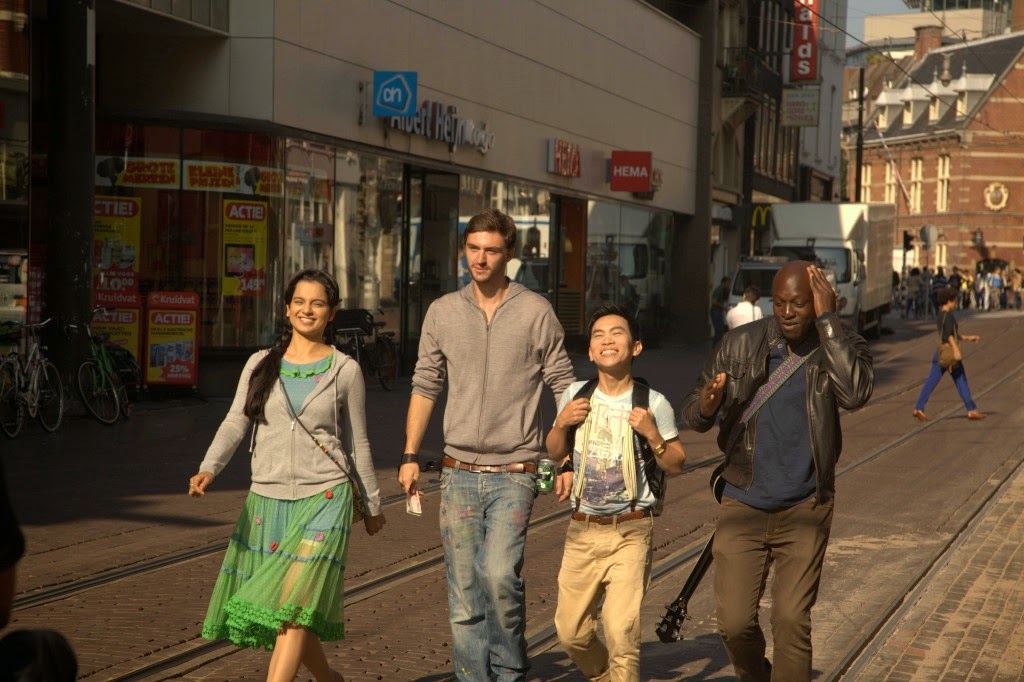Love, dhokha aur emancipation-Without losing virtue or virginity-Reviewing 'Queen (2014), Hindi'
Deciding on movies to watch and
movies to ditch (in the theatre) is not a difficult job. Particularly when you
are a married person living in India on a student allowance. With Hindi
language films made in India, it’s even simpler. Do not watch anything unless
it is directed by one of them four directors whose work I absolutely adore. One
Sunday (supposed to be last Sunday but for my lazy ass), I broke this rule.
There were two main reasons: 1. It came heavily recommended by a friend. 2. The
film was produced by one of ‘the’ 4 directors. And while I wasn’t disappointed,
it didn’t blew me off either. However, my wife absolutely loved it and later
argued that it would be impossible to find an Indian woman or a girl who would
not love this movie. And till now her theory has held as water-tight as
Newtons’ theory of gravity.
The movie in
the question is Queen directed by Vikas Bahl, who co-owns Phantom Films with
Vikramaditya Motwane (see Udaan) and
Anurag Kashyap (see Black Friday). The
ingenuity of the movie lies in the fact that it starts where many rom-com/coming
of age movie ends: i.e. one of the protagonists, realizing right at the moment
of putting that varmaala or that sindoor, that his/her choice is a wrong
one. And one of them gets unceremoniously dumped (see Mujhse Dosti Karoge, Mujshe Shaadi Karogi, Mere yaar Ki shaadi hain,
Kuch Kuch Hota Hain and many more whose existence I am unaware of but which
exists nevertheless. And incase you are wondering, no; No one gets ditched at
the alter or runs away before saying ‘Qoobool
hai’ because our heroes and heroines are always Hindu unless the story has
to convey some national integration message or it has to show a wronged person turning
out to be a terrorist, in the middle or at the end.
Queen, the film, begins with Rani’s
(played with impressive confidence by Kangana Ranaut) fiancé (Rajkummar Rao in a
superb form replaying his charming douchebag character from Love Sex aur Dhokha)
realizing that his girlfriend of 7-8 years is not fit to be his wife after all.
And as the nervous and virgin Rani prays to Ma Vaishno Devi
to take care of her on her wedding night, her rascal groom announces break-up. After
crying over spilled milk for a full day, Rani, out of the blue, decides to proceed
to Paris and Amsterdam, her pre-determined honeymoon destinations, alone. The
tickets were obviously booked by her parents and probably formed a teeny-weeny slice
of the dowry-pie. How this impulsive trip leads to the metamorphosis of ‘Rani’
into ‘Queen’ is what the movie is all about.
Along the way we are treated to
the hostel culture of European cities, to some bland racial balancing acts, cultural
stereotypes and some cringe-worthy emotions involving a tsunami and a Jap (can
Japs be far when we speak of tsunami?). The film shines in the little detailings:
the younger brother accompanying the to-be-wed bride, Rani struggling to lift
the suitcase to the room in her Parisian hotel (since in cheap accommodation in
Europe you neither have lift nor service boys). While watching I got high on the excellent music,
in particular, London thumakda, which continues to thrill.
In terms of treatment
and genre, Rani is yet another version of the north-Indian (read Delhi) rom/com/wedding/crime/drama,
a new sub-genre treatment that Band Baaja Baarat unleashed on the Hindi cinema. What Dibakar
Banerjee started with his indie offerings of Khosla ka Ghosla and Oye Lucky Lucky Oye, YRF capitalized on with the excellently scaled and performed Band Baaja Baaraat. That also heralded a wave which probably would culminate in Hindi
cinema being reduced to regional cinema telling mostly the stories of the NCR
region, going by the number of movies that exploits this genre: Do Dooni Char,
Ishaqzaade, Hasi to Phasi, Shudh Desi Romance, Ladies Vs Ricky Bahl, Fukrey,
Ranjhana etc etc. Hasn’t Parineeti Chopra, the eternal bubbly-voluble-spontaneous
north Indian girl, built an entire career out of constantly plagiarizing Shruti
Kakkar?
The viewers of Hindi films are so
used to watching trash that when a film’s characters, places and cultures
present a slice of reality, it seems as a novelty, which is both ironic and
tragic. Queen is novel in exactly that way. Never brilliant. And never pushing or
even trying to push the boundaries. Not that I am nitpicking but when Rani is
in the cooking competition in Amsterdam, which probably started in the morning
(say about 10 am) and makes an international call (instead of googling for it
on her smart phone) to dig out the English for ‘hing’, everyone seems to be in
the middle of their sleep in the middle of the night. In reality it would
have been late noon/afternoon.
Mixing three races (Black, White
and Oriental) seemed too lazy, forced, humdrum and clichéd an effort to balance
the racial equation with ‘brown’ Rani completing the overt message of racial harmony. And those same gheesa pitta 'Indian' values were
artificially reinforced when Rani, who swore to be a virgin till her wedding
night, remained a virgin, even after travelling alone in two of the sexiest
places of Europe, living with three guys and kissing, albeit awkwardly, a hot
Italian hunk. And that is where Queen lost the plot for me. But I was glad (and
relieved) that in my filmi universe, Band Bajaa Baraat and Anushka Sharma shall
continue to be the original and unchallenged Queen (of my hearts).





Comments
Post a Comment